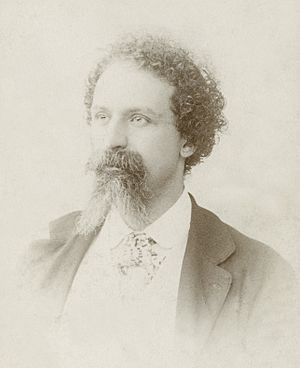Enrico Ferri (criminologist) facts for kids
Quick facts for kids
Enrico Ferri
|
|
|---|---|
 |
|
| Born | 25 February 1856 San Benedetto Po, Lombardy–Venetia
|
| Died | 12 April 1929 (aged 73) |
| Scientific career | |
| Academic advisors | Cesare Lombroso |
Enrico Ferri (born February 25, 1856 – died April 12, 1929) was an important Italian expert who studied crime and criminals. This field is called criminology. He was also a socialist, which means he believed in a political idea where society works together for everyone's good.
Ferri was a student of Cesare Lombroso, who started the Italian school of criminology. While Lombroso looked at physical reasons why people might commit crimes, Ferri focused on social and economic reasons. He was an editor for the socialist newspaper Avanti!. In 1884, he published his book Criminal Sociology. His ideas later helped create Argentina’s laws about crime in 1921. Even though he first disagreed with the Italian dictator Benito Mussolini, Ferri later became one of Mussolini's main supporters.
Contents
About Enrico Ferri
Enrico Ferri was born in Lombardy, Italy, in 1856. He first worked as a lecturer and then became a professor of Criminal law. He had studied with Cesare Lombroso. Lombroso studied how a person's body might affect crime. But Ferri focused more on how society and money problems influenced criminals and crime rates.
Ferri's studies led him to believe that preventing crime should be the main goal of law enforcement. He thought it was better to stop crimes before they happened, instead of just punishing criminals afterwards. He helped start the positivist school of criminology. He studied how psychology and society influenced crime, which was different from Lombroso's focus on biology.
Ferri's Political Life
Ferri was a radical politician. He was elected to the Italian Parliament in 1886. In 1893, he joined the Italian Socialist Party. He also edited their daily newspaper, the Avanti. In 1900 and 1904, he spoke out in Congress. He was against socialist ministers working in governments run by the wealthy.
During World War I, Ferri wanted Italy to stay neutral. He was re-elected as a Socialist Party member in 1921. After the war, he started to support Mussolini's Fascist government. Ferri passed away in 1929.
Ferri's Books and Writings
Ferri wrote several important books about crime and society. Here are some of them:
- Studi dalla criminalità in Francia dal 1826 al 1878, 1881.
- Socialismo e criminalità, 1883.
- Sociologia criminale, 1884.
- Socialismo e scienza positiva, 1894.
- I socialisti nazionali e il governo fascista, 1923.
- Il Fascismo in Italia e l'opera di Benito Mussolini, 1928.
Ferri's Ideas About Crime
Ferri disagreed with Lombroso's idea that criminals were born with certain physical traits. Instead, Ferri focused on a person's psychological traits. He believed these traits explained why someone might commit a crime. These traits included things like how a person used slang, their handwriting, or their secret symbols. He also looked at their literature and art.
Ferri also talked about a lack of feeling or "moral insensibility." This meant not feeling bad about a crime before doing it, and not feeling sorry afterwards.
Ferri thought that feelings like religion, love, honour, and loyalty did not cause criminal behavior. He believed these ideas were too complex to truly affect a person's basic sense of right and wrong. However, he argued that other feelings, like hate, greed (called cupidity), and vanity, had a bigger influence. He thought these feelings had more control over a person's moral sense.
Ferri summed up his theory by saying that criminal psychology is "a weak ability to resist criminal urges and temptations." He thought this weakness came from a lack of self-control, like what you might see in children.
Ferri's Political Views
Ferri often compared socialism to Darwinism, which is the theory of evolution. He disagreed with some ideas that said these two beliefs were opposite. Instead, Ferri argued that Darwinism actually gave socialism its main scientific ideas.
Ferri believed that religion and science were like a seesaw: when one became stronger, the other became weaker. He saw that Darwinism challenged religion and the church's ideas about how the universe began. Because of this, he thought socialism grew stronger. So, Ferri argued that socialism was a natural extension of Darwinism and the theory of evolution.
Towards the end of his life, Ferri became a strong supporter of Benito Mussolini. He began to see fascism as a way to express socialist ideas. He believed fascism was about the state being strong, rather than focusing on individual freedom.
See also
 In Spanish: Enrico Ferri para niños
In Spanish: Enrico Ferri para niños





